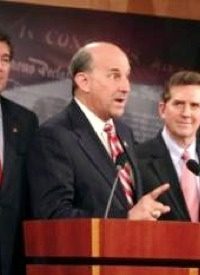
Representative Louie Golmert of Texas has recently proposed that United States senators be elected as they once were, by the legislatures of the states. This would require a repeal of the 17th Amendment, which requires direct election of senators by the people.
When the Constitution was adopted, state governments were given great power and, in particular, state legislatures were given vast power. This was intended to make the language of the Constitution, which preserves the states as sovereign entities, protect that sovereignty in practice. When the two senators from each state were chosen by state legislatures, then those senators would not last long if they advocated a surrender of state power to the federal government.
The president also was not chosen by the people, but by presidential electors who were chosen themselves not by the people but by the state legislatures. This effectively gave state legislatures control over the presidency and the Senate. Because the president nominates and the Senate confirms federal judges, the nomination and confirmation of members of thee Supreme Court and all inferior federal courts also were subject to veto by the states.
The intention of the Founding Fathers was that these United States be a federation of equal members. Each state might have very different policies and laws on different issues, but people could choose which state they wished to live in, and so robust state governments naturally led to general freedom for all Americans.
The Constitution and Bill of Rights, which enshrined the sovereignty of the states, could not be amended without the concurrence of three quarters of the states. Again, the Founding Fathers saw how to prevent the federal government from whittling away at states’ rights.
The crumbling of states’ rights became when federal judges began to arrogate to themselves the power to amend the Constitution by simply reading it as they chose. Five justices became equal to 76 state legislative chambers. State legislators also gave up their power to choose presidential electors by providing that these individuals be elected by the people (in the early American presidential elections, there was no “popular vote” at all — not even for presidential electors.)
The greatest loss, though, came when the states voluntarily agreed to amend the Constitution so that the people, not the state legislators, would now choose the members of the Senate. After that, there were virtually no real checks that state governments had to preserve their balanced rights in our federal system. Would amending the Constitution to repeal the 17th Amendment restore that balance? Yes, if state legislatures also became to assume responsibility again for electing the president (by choosing the electors, rather than leaving that to the people) and if state legislatures had the backbone to begin to reassert their rights.
The strong reaction to the massive healthcare bill by states’ attorneys general is a good sign that perhaps states are ready to step back into their intended role in our federal system. Having robust states is not a partisan issue. It is not even an issue on what policies a particular state should adopt (if Massachusetts wishes to tax itself into penury, it is that state’s right — as long as the rest of us do not need to bail the Bay State out.)
Photo of Representative Louie Golmert of Texas from his website



